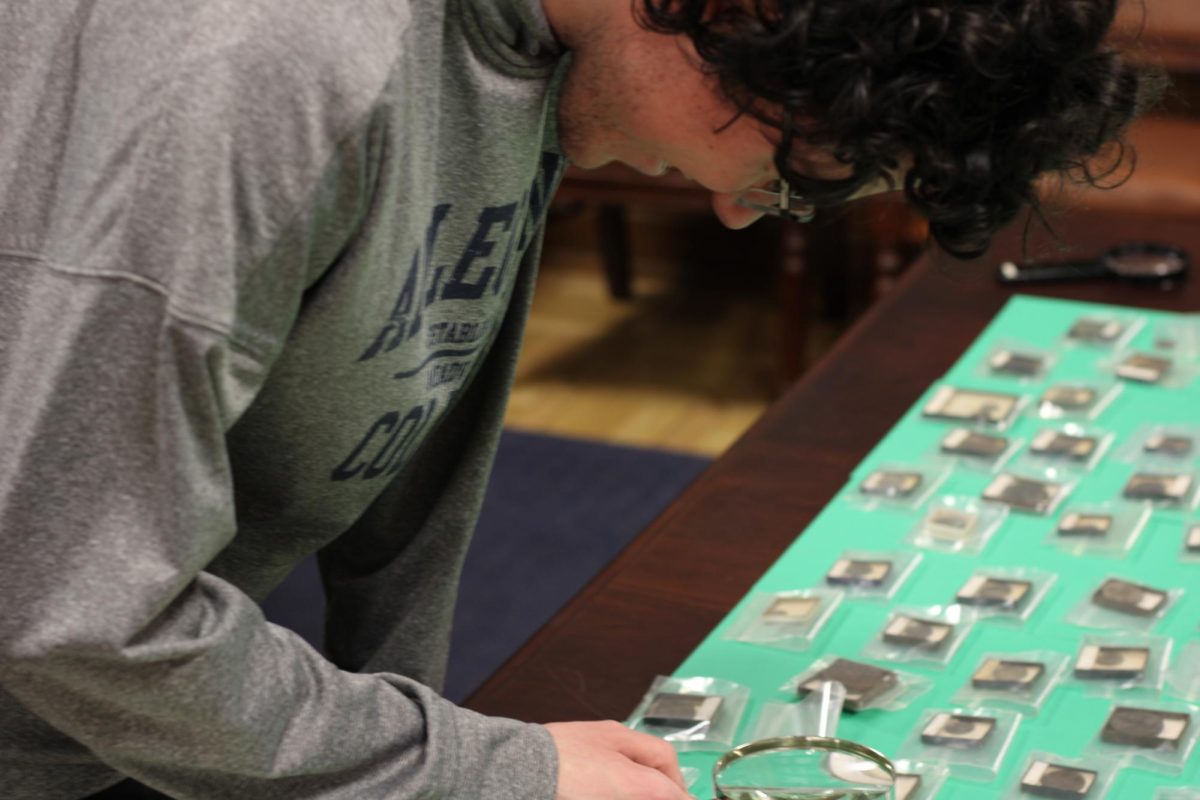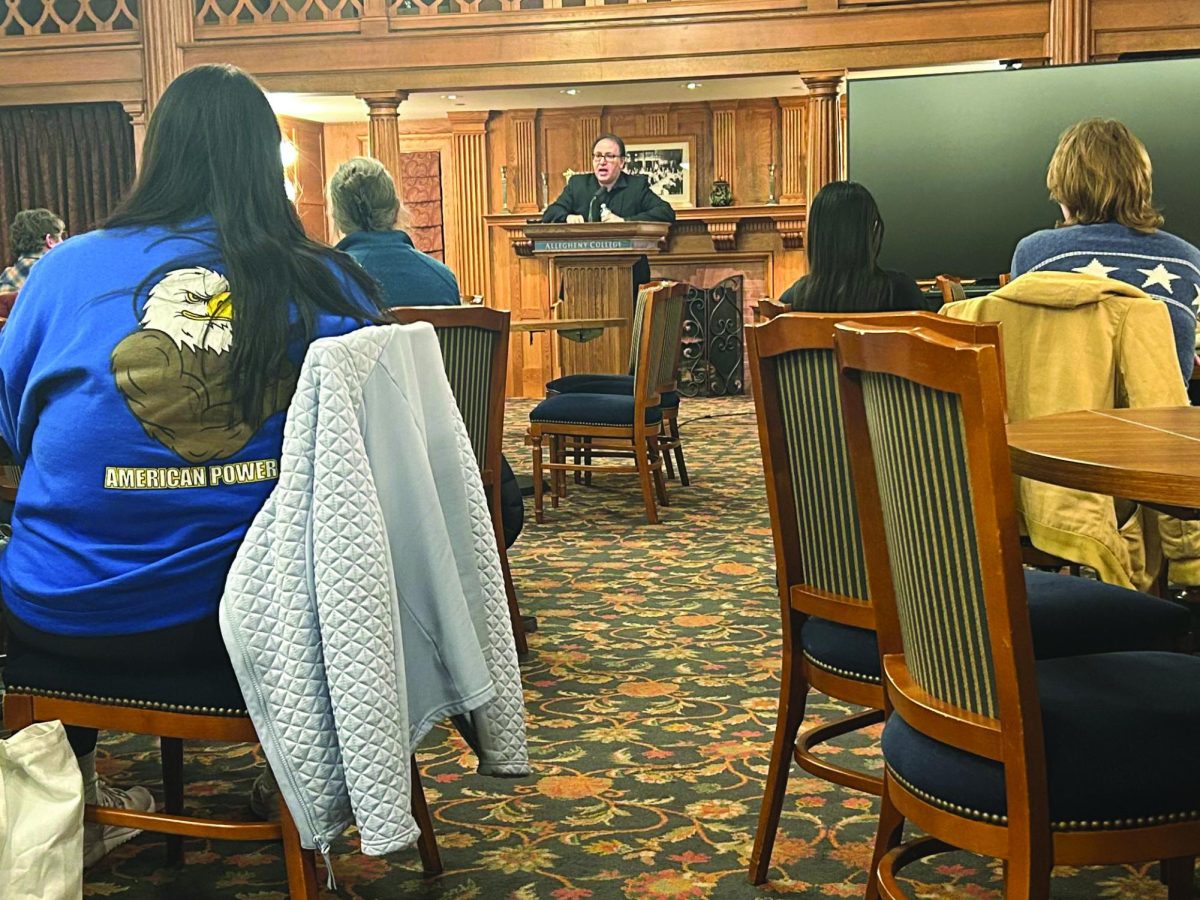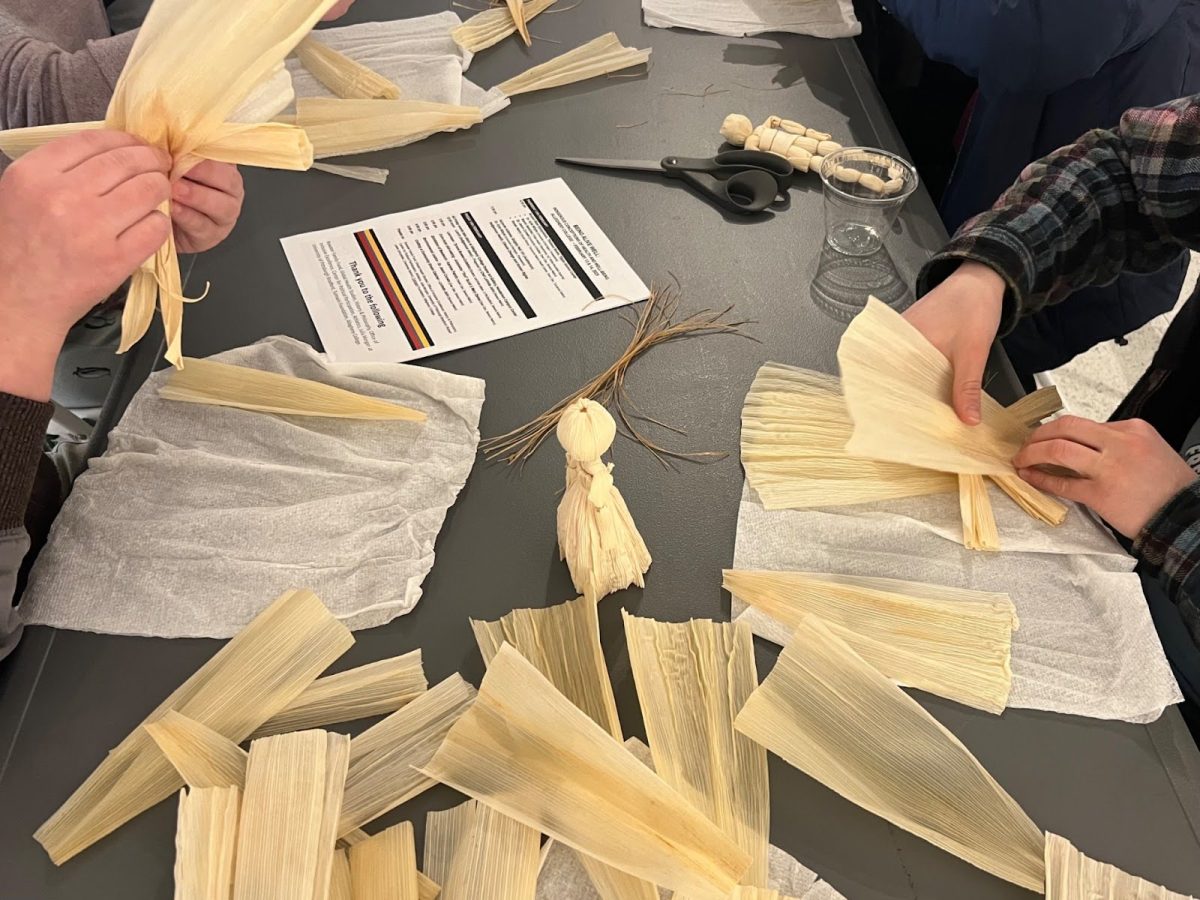Diana Reimer, one of the coordinators of the Tea Party Patriots spoke at Allegheny College on Monday to a freshman seminar class. She also gave an open discussion later that evening.
Reimer explained to students the three core values of her organization: fiscal responsibility, constitutionally limited government and free markets. Her visit to campus prompted a lively discussion about the Tea Party, its effect on domestic politics and her role as a spokeswoman for a national political movement.
“I think it was wonderful that she took the time out of her busy schedule to come here, and I think it was great that we got to hear her perspective,” said Professor Shea, director of the Center for Political Participation. “But at the same time, I don’t think that she was well-prepared to answer some of the more substantive questions from our thoughtful students.”
Nick Diana, ’13, president of the College Democrats, agrees.
“From what I’ve heard of the Tea Party, her beliefs seem to be pretty parallel as far as wanting fiscal responsibility, but sort of not defining what that is,” said Reimer. “And that, to me, hurts not only her position but the party’s position in general. She stated three core beliefs, but when that foundation’s built on sand, or no sand at all, that does sort of undermine every argument she made.”
Derek Dye, ’11, president of the College Republicans, felt that Reimer’s core beliefs were more than foundations of sand, however, and argued on behalf of the humanity Reimer represented when dealing with the public.
“She was very open-ended and direct. She was able to, in some of the policy points, point to specific things she felt strongly about, but then there were other points people felt strongly about, and they would pull up statistics they would want a comment on, on behalf of the Tea Party, and she would say, ‘I’m not going to speak on behalf of the Tea Party; I’m an individual.’”
“I just respect that fact that she had the humility to say, ‘I don’t know,’” added Dye.
The Campus sat down with Ms. Reimer for a Q and A session.
Q1: The Gallup Poll, which conducted a survey of Tea Party supporters, opponents and those neutral to the movement, found that 81% of opponents, 48% of neutrals and 44% of supporters believe the Party is creating deeper political divisions within the United States. Do these numbers concern you? How would you address claims that the Tea Party has led to a decline in civility in politics?
ANS1: I wasn’t aware that the Tea Party had caused a decline in civility in politics.
Q2: Social Security, Medicare, Medicaid and other federal welfare programs, as well as unemployment benefits, comprise 56.7% of the federal budget. That’s about $2 trillion per year. Tea Party supporters declared, in the Wall Street Journal, that budget cuts to these programs to reduce the national deficit were ‘unacceptable’ by a significant 2 -1 margin. Does the Tea Party plan to address the concerns raised by the continued growth in cost of these programs and their effect on the deficit?
ANS2: I can only speak for myself, but something does need to be done with the Social Security, even though I’m on Social Security. I think that the younger people, like you, should be able to make a decision as to where your money is going, and had the government not borrowed money, and not put it back, maybe we wouldn’t be in this situation that we are now. But something does have to be done with Social Security, Medicare, Medicaid… There’s a lot of programs out there that they should be looking at to reduce the deficit.
Q2: Can you name any? Is that just a proposal they should look at?
ANS2: Well, your welfare programs… How many people might be on there that shouldn’t be? How many people are collecting that shouldn’t be collecting money from the government?
Q2: So you would support stricter welfare standards?
ANS2: My husband and I have always worked for what we needed, and if something happened and they took our Social Security away and our Medicare, then we would make our way as we had all our life. We would find a way. So something does need to be done with this deficit; I don’t know that those are exactly the problems. I think they have to stop spending money that we don’t have.
Q3: CNBC reported that ‘government pay-outs,’ like Social Security, Medicare, and unemployment benefits, make up 35% of all wages and salaries in the US. Most of these payments are made from credit expansions of the national government. In other words, the national government is borrowing and paying out on a massive scale and printing more dollars to fulfill their obligations. Does this concern Tea Party leaders, and if so, how are they addressing it?
ANS3: Well, they have to stop printing money. Because our dollar is worth nothing right now. They have to stop saying that that’s the answer. They have to get a hold on what the problems are, and solve those problems. Whether it’s cuts in Social Security, whether they change the age of Social Security…. I don’t know the answers. But to be fiscally responsible, they have to stop the spending.
Q4: Has Ron Paul, 2008 Presidential candidate and long-time critic of the Federal Reserve, made a significant impact on the Tea Party movement in your opinion? What is your position on his proposal that the national government drastically cut military spending?
ANS4: I don’t agree with Ron Paul’s way of thinking. The Federal Reserve, that’s a big problem. But to cut military spending—that’s not good, especially if it’s going to affect our men and women that are out there fighting to keep us free. Ron Paul has a lot of followers, and I’m wondering why he has all those young followers. Maybe it’s because of his stand on the war.
Q5: What is your position on the impact of the Federal Reserve on the national economy?
ANS5: We don’t really get into the Federal Reserve issue, but I do feel that the Federal Reserve has to be looked into. What its effect on the national economy is, I don’t know.
Q5: Ron Paul wanted to audit the Fed… Do you think the Tea Party would support that movement?
ANS5: I can’t speak for the Tea Party movement. The Fed should, I feel, be audited, but that’s my opinion.
Q6: Could you describe the nature of the Tea Party’s relationship with the Republican Party and its leadership?
ANS6: Actually, most of the Tea Party people are conservatives. There is no relationship between the Republican Party and the Tea Party leadership. These people have gotten into office, obviously, because of the support they had from Tea Party people and we’re going to hold them accountable. If they don’t do what they’re supposed to do, then we’ll just throw them out and get somebody else who will do it.
Q7: Could you describe the nature of the Tea Party’s relationship with the Democratic Party and its leadership?
ANS7: I don’t think that there is a relationship with the Democratic Party.
Q8: Do you think that the Tea Party will become a viable third party in the future?
ANS8: I don’t think, at this point, no. We are not looking into it. Number one, it takes years and years and a lot of money to become a party. Tea Party Patriots will continue to educate the people on politics and the candidates so they can make informed decisions and basically, all this has to start at the local level, at your school boards, at your borough hall meetings, and get people involved as committee people, because that’s where it all starts, locally.






